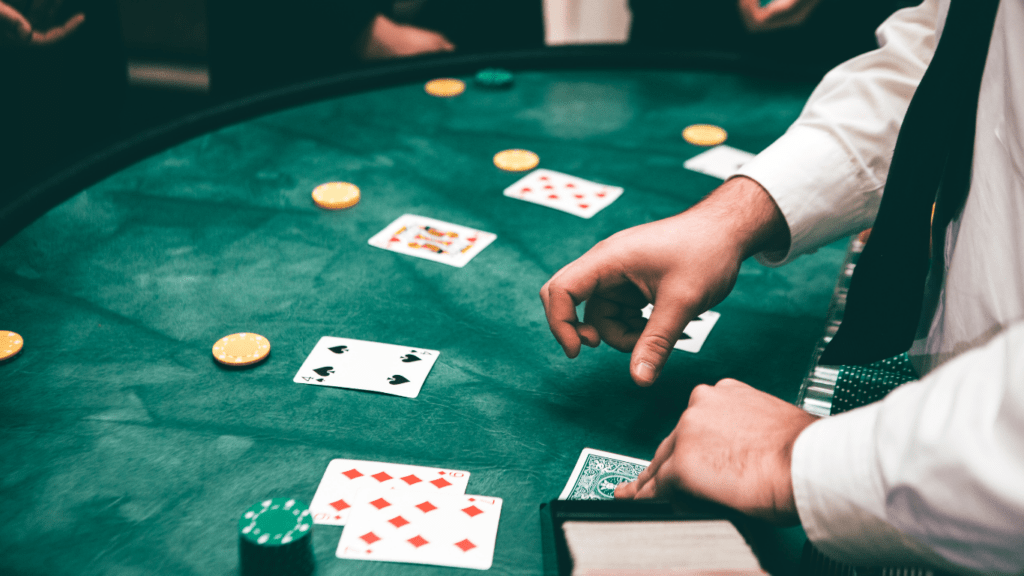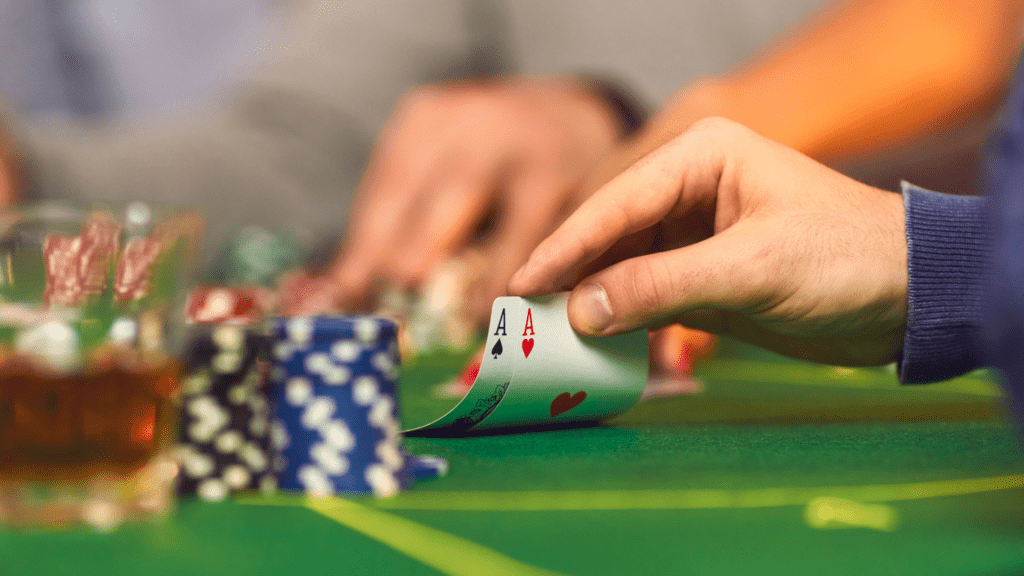Understand the Basics
To compete effectively in a poker tournament, grasping the fundamental rules and structure is essential. Poker has variants, but tournaments often use Texas Hold’em. In this variant, players are dealt two private cards and share five community cards to form the best hand among participants.
Learn Hand Rankings
Knowing hand rankings is crucial. Here are the rankings in descending order:
- Royal Flush: A, K, Q, J, 10 of the same suit.
- Straight Flush: Five consecutive cards of the same suit.
- Four of a Kind: Four cards of the same rank.
- Full House: Three of a kind and a pair.
- Flush: Five cards of the same suit, not in sequence.
- Straight: Five consecutive cards of mixed suits.
- Three of a Kind: Three cards of the same rank.
- Two Pair: Two different pairs.
- One Pair: Two cards of the same rank.
- High Card: The highest card when no other hand is made.
Understand Betting Rounds
In Texas Hold’em, there are four betting rounds: pre-flop, flop, turn, and river. Each round provides opportunities to bet, check, raise, or fold. Familiarity with these rounds aids in making informed decisions during play.
Familiarize with Common Terms
Knowing poker terms improves gameplay. Some essential terms include:
- Blinds: Forced bets posted by players left of the dealer button.
- Flop: The first three community cards dealt.
- Turn: The fourth community card.
- River: The fifth and final community card.
- Pot: The total amount of money bet in a hand.
- Check: Passing the action to the next player without betting.
- Raise: Increasing the current bet.
Practice Online
Online poker platforms provide a risk-free environment to practice. Utilize these platforms to understand game flow, familiarize with hand rankings, and improve decision-making skills. Practice sharpens strategy and increases confidence ahead of the actual tournament.
Understanding these basics equips you with the knowledge to navigate the tournament confidently.
Research the Tournament
Preparing for a big poker tournament demands thorough research. Understanding specific details can significantly impact performance.
Type of Tournament
The type of tournament dictates the strategy. Knowing if it’s a freezeout, re-buy, or satellite event helps in planning. Freezeouts don’t allow re-entry once eliminated. Re-buys let players buy back in if they lose all chips. Satellites offer entries into larger tournaments. Identifying the type ensures aligning your approach accordingly.
Tournament Rules and Structure
Tournament rules and structure provide critical information. Verify the starting chip stack, blind levels, and duration. Different tournaments have varying blind increase rates, affecting how aggressively or conservatively you play. Familiarizing yourself with the blinds schedule, break times, and payout structure offers a competitive edge. For instance, understanding payout distribution informs you of the stages where risks or conservative play can be beneficial.
Develop a Solid Strategy

To succeed in your first big poker tournament, develop a solid strategy. An effective plan combines practice and understanding of opponents.
Practice Online
Practice online to sharpen your skills. Online poker platforms like PokerStars and 888poker offer various games and tournaments, allowing you to simulate tournament conditions. Focus on different formats, such as No-Limit Hold’em and Pot-Limit Omaha, to enhance versatility. Track your performance by reviewing hand histories to spot and rectify mistakes. These insights help refine your strategy before the live event.
Study Opponents
Study opponents to gain a competitive advantage. Research known players’ styles through forums like Two Plus Two and review past tournament footage on sites like YouTube. Identify patterns in their play, such as aggression in early rounds or conservative strategies near the bubble. Use software like PokerTracker to analyze their tendencies if you have access to it. Recognizing these patterns helps build a counter-strategy tailored to the competition you’ll face.
Physical and Mental Preparation
Preparing physically and mentally enhances performance in a poker tournament. Conditioning the body and mind ensures peak performance when it’s most needed.
Importance of Sleep
Getting quality sleep significantly impacts mental acuity and decision-making. Aim for 7-9 hours of rest each night leading up to the tournament. Consistent sleep patterns improve cognitive functions by enhancing memory retention and reaction times. Lack of sleep leads to fatigue, which negatively affects concentration and increases the likelihood of making errors during high-pressure situations.
Nutrition and Exercise
Proper nutrition fuels both the body and mind. Focus on consuming balanced meals rich in lean proteins, complex carbohydrates, and healthy fats. For example, eat whole grains, lean meats, and vegetables. Avoiding excessive sugar and caffeine prevents energy crashes. Staying hydrated is crucial, so drink plenty of water throughout the day.
Regular exercise contributes to overall well-being. Integrate aerobic activities like running or swimming to boost cardiovascular health and endurance. Strength training supports muscle tone and helps maintain stamina during long tournament sessions. Even light activities like walking improve mental clarity and reduce stress levels.
Manage Your Bankroll
Effective bankroll management is crucial for success in poker tournaments. It minimizes financial risk and allows you to play confidently.
Setting a Budget
Set a clear budget for your poker activities. Base this budget on your financial situation and avoid risking more than you can afford to lose. Take into account both buy-ins and potential re-buys if the tournament format allows them. For instance, if my disposable income is $1,000, I might allocate 10-20% of that to poker, ensuring my financial health remains stable.
Avoiding Tilt
Tilt, an emotional reaction that affects decision-making, can devastate a bankroll. Develop strategies to stay calm and rational. Take deep breaths, step away from the table for a brief moment, or use positive self-talk to maintain control. For example, if I lose a big hand, I might remind myself that poker is a long-term game and one hand doesn’t define my success. Stay focused on your strategy and disciplined in your play to avoid making impulsive decisions.
Pack Essential Items
Packing essential items ensures comfort and preparation during a poker tournament. Here’re key aspects to focus on.
Comfort and Convenience
Bringing items for comfort can enhance focus and performance. I always pack comfortable clothing, like soft t-shirts and relaxed jeans, to avoid any irritation during long sessions. Noise-canceling headphones help me concentrate and block out distractions. A personal water bottle keeps me hydrated, and having healthy snacks on hand prevents energy dips. Lastly, a good luck charm or a familiar item can provide a mental boost.
Necessary Documentation
Proper documentation is vital for a smooth entry into the tournament. I ensure to carry my ID and tournament registration confirmation. A copy of my hotel reservation helps streamline check-in and avoid last-minute issues. If traveling internationally, my passport and any required visas are essential. I also bring copies of important contact information, such as emergency contacts and the tournament organizer’s details. Keeping these documents organized in a folder or a travel wallet prevents any potential hassle.
During the Tournament
Once the tournament begins, my focus shifts to maintaining concentration and making strategic adjustments as necessary.
Stay Focused
Concentration is critical to success in a poker tournament. I stay focused by keeping distractions to a minimum and actively observing other players’ behavior and betting patterns. To help maintain mental clarity, I take short breaks between hands, practice deep breathing, and stay hydrated. Using noise-canceling headphones and listening to calming music or white noise can also enhance focus.
Adjust Strategy as Needed
Flexibility in strategy is essential in a dynamic environment like a poker tournament. I evaluate my opponents’ skill levels, table dynamics, and the changing blind structure. If opponents are playing aggressively, I might tighten up my play and choose my hands more selectively. Conversely, if the table leans towards passive play, I can exploit this by taking more calculated risks and bluffing more frequently. Constantly adapting my strategy based on real-time observations increases my chances of success.



 Elizabeth Dinglerrin
Founder & CEO
Elizabeth Dinglerrin is the visionary founder behind Bet Wise Daily. With a wealth of experience in the gambling industry and a deep passion for data-driven insights, Elizabeth established Bet Wise Daily to provide a comprehensive source of news, analysis, and exclusive content for casino enthusiasts. Her leadership and strategic acumen have shaped the platform into a leading authority in gambling media. When she's not immersed in the latest trends or pioneering new features, Elizabeth enjoys sharing her expertise at industry conferences and mentoring aspiring professionals in the field.
Elizabeth Dinglerrin
Founder & CEO
Elizabeth Dinglerrin is the visionary founder behind Bet Wise Daily. With a wealth of experience in the gambling industry and a deep passion for data-driven insights, Elizabeth established Bet Wise Daily to provide a comprehensive source of news, analysis, and exclusive content for casino enthusiasts. Her leadership and strategic acumen have shaped the platform into a leading authority in gambling media. When she's not immersed in the latest trends or pioneering new features, Elizabeth enjoys sharing her expertise at industry conferences and mentoring aspiring professionals in the field.
